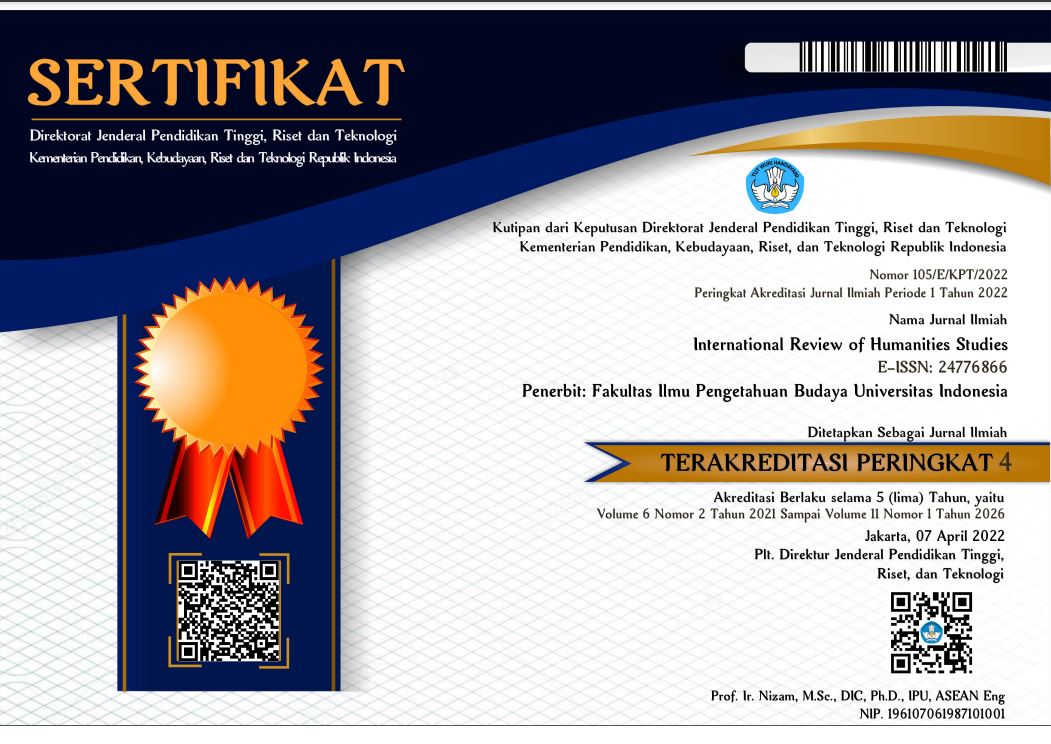International Review of Humanities Studies

Abstract
Writing skills are one of the skills that must be mastered by language learners. As an effort to improve writing skills, the researcher uses the Task Based Language Teaching (TBLT) approach. The TBLT approach is carried out on 19 level 1 students of the English Literature study program in learning descriptive writing skills in English. The type of research conducted is Classroom Action Research (CAR) in collaboration with lecturers of Writing 1 class. The research is supported by qualitative and quantitative data to determine the students’ improvement in the process of learning descriptive writing using TBLT. The results show a significant increase in the results of descriptive writing tests conducted in the first and second cycles. In addition, the use of TBLT can motivate students in the learning process. The results of this study were obtained based on the grades of the descriptive writing tests, observations and questionnaires. The results of the post-test indicate an increase in the average student score to 85.6 from the average pre-test score of 62.2. Finally, the results of the questionnaire also show that almost all students agreed to use TBLT as a guide in Descriptive writing, and it has proven to be able to improve the students’ writing skills.
References
Arikunto, S. (2006). Prosedur research : Suatu pendekatan Praktek. Jakarta: Rineka Cipta.
Arikunto, S., Suhardjono, & Supardi. (2015). Research Tindakan Kelas Edisi Revisi. Jakarta: Bumi Aksara.
Batstone, R. (2012). Language form, task-based language teaching and the classroom context. ELT, 66(4), 459-467.
Burns, A. (2010). Doing Action Research in English Language Teaching. New York: Routledge.
Brown, H. D. (2001). Teaching by Principles : An Interactive Approach to Language Pedagogy. New York: Pearson Education.
Brown, H. D. (2004). Language Assesment : Principles and Classroom Practices. Upper Saddle River, USA: Pearson Education.
Brown, H. D. (2007). Principles of Language Learning and Teaching. New York: Pearson Longman.
Brown, H. D. (2008). Prinsip Pembelajaran dan Pengajaran Bahasa (Bahasa Indonesia ed.). Jakarta: Kedutaan Besar Amerika.
Collins, R. (2013). Authentic assessment : assessment for learning . Curriculum and Leadership Journal vol 11. Diakses pada 19 Oktober 2018, dari http://www.curriculum.edu.au/leader/authentic_assessment_assessment_for_learning,36251.html Doyin, M., & Wagiran. (2010). Bahasa Indonesia Pengantar Penulisan Karya Ilmiah . Semarang: Unnes Press.
Ellis, R. (2006). Methodology of task based teaching. EFL Asia, 3(8), 19-45. Ellis, R. (2003). Task Based Language Learning and Teaching. Oxford: Oxford University Press.
Gie, T. L. (2002). Terampil Mengarang. Yogyakarta: Yogyakarta Andi. Gerot, L. & Wignell, P. (1995). Making Sense of Functional Grammar. Queensland: Gerd Stabler, Antipodean Educational Enterprises.
Harmer, J. (2004). How to Teach Writing. Harlow: Pearson Education Limited.
Hartono, R. (2013). Ragam Model Mengajar yang Mudah Diterima Muris. Yogyakarta: DIVA Press.
Harmer, J. (2007). How to Teach English. Cina: Pearson Education Limited.
Hyland, K. (2003). Second language Writing. New York: Cambridge University Press.
Keraf, G. (1981). Eksposisi dan Deskripsi. Flores: Nusa Indah.
Watkins, M., & Knapp, P. (2005). Genre Text, Grammar Technologies for Teaching and Assesing Writing. Sydney: University of New South Wales Press.
Kusumayati, L. D. (2015).Peran Task Based Learning, Widya Wancana 1(10), 216-225.
Larsen, D. F. (2000). Techniques and Principles in Language Teaching. Oxford: Oxford University Press.
Nunan, D. (2004). Task Based Language Teaching. Cambridge: Cambridge University Press.
Nunan, D. (2003). Practical English language Teaching. Singapore: Mc Graw Hill.
Nunan, D. (1989). Designing task for communicative classroom. Cambridge: Cambridge University Press. Nunan, D., & M.
Bailey, K. (2009). Exploring Second Language Classroom Research A Comprehensive Guide. Boston: Heinle Cengage Learning.
Nurgiyantoro, B. (2010). Penilaian Pembelajaran Bahasa. Yogyakarta: BPFE. Nursisto. (1999). Penuntun Mengarang. Jakarta: Aditia Karya Nusa
Mahsun. (2014). Teks dalam Pembelajaran Bahasa Indonesia Kurikulum 2013. Jakarta: Raja Grafindo Persada.
Orr, J. K. (1999). Growing Up with English. USA: United State Departement of State Washington, DC. Oshima, A., & Hogue, A. (1999). Writing Academic English (3rd Edition). New York: Pearson Education.
Popham, W. (1995). Classroom Assessment. Boston: Allyn and Bacon.
Roberts, M. (2007). Teaching in the multilevel classroom. ELT, 42(2) 33-38.
Robinson, P. (2011). Task Based Learning: A review of issues. Language Learning, 61(s1), 1-36. doi:10.1111/j.1467-9922.2011.00641.x
Ruddell, M. (2005). Teaching Content Reading and Writing. USA: Wiley Jossey- Bass Education. Sanjaya, W., & Budimanjaya, A. (2017). Paradigma Baru Mengajar. Jakarta: Kencana.
Tarigan, H. G. (2008). Menulis sebagai suatu keterampilan berbahasa. Bandung: Angkasa.
Tickoo, M. L. (2003) Teaching and Learning English: A Source Book for Teachers and Teacher-Trainer. New Delhi: Orient Longman
Watkinds, L. D. (1999). Action Research: Rethinking Lewin. SAGE journals, 30(2), 127-140.
Willis, J. (1996). A Framework for Task based Learning. Edinburgh: Wesley Longman.
Yamin. M. (2004). Strategi Pembelajaran Berbasis Kompetensi. Jakarta: Gaung Persada Press.
Recommended Citation
Inayanti, Inayanti and Halimi, Sisilia Setiawati Dr.
(2019)
"THE USE OF TASK BASED LANGUAGE TEACHING (TBLT) AS TO IMPROVE DESCRIPTIVE WRITING SKILLS,"
International Review of Humanities Studies: Vol. 4:
No.
2, Article 19.
Available at:
https://scholarhub.ui.ac.id/irhs/vol4/iss2/19
Included in
Arts and Humanities Commons, Curriculum and Instruction Commons, Educational Leadership Commons, Life Sciences Commons, Social and Behavioral Sciences Commons


